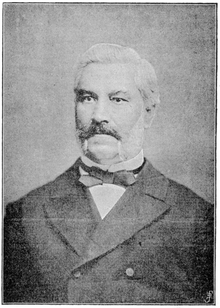Feofan Lebedynzew
Feofan Hawrylowytsch Lebedynzew ( Ukrainian Феофан Гаврилович Лебединцев , Russian Феофан Гаврилович Лебединцев Feofan Gawrilowitsch Lebedinzew ; born March 12, jul. / 24 March 1828 greg. In Selena Dibrova , Kiev Governorate , Russian Empire , † March 12 jul. / March 24 1888 greg. In Kiev , Kiev Governorate, Russian Empire) was a Ukrainian historian, journalist, editor and university professor.
Life
Feofan Lebedynzew was born in Selena Dibrowa in today's Horodyschtsche Rajon of the Ukrainian Oblast of Cherkassy as the son of a village priest. He received his training first at the Theological Seminary in Bohuslaw , which he completed in 1841. He then studied at the Kiev Theological Seminary , which he graduated brilliantly in 1847, and at the Kiev Theological Academy , where he defended his academic candidacy for the Church Union of Brest in 1851 and left as a theology candidate .
After completing his studies, Lebedynzew accepted a teaching position at the Theological Seminary in Voronezh , where he taught general history, Latin and Russian civil history, among other things. In 1856 he switched to teaching at the Kiev Theological Seminary , where he worked until 1861. On his initiative, the magazine Counselor for Rural Priests in Kiev was published from 1860 to 1863 , in which he published a number of articles on local history. He also wrote articles for the Osnova newspaper in Saint Petersburg . In 1861 he became an associate professor at the Kiev Theological Academy in the Faculty of History.
On December 4, 1864 he left the academy and became head of the school directorate of the school district, first in Chełm , then in Lublin and in 1872 in Radom . In the Cholmer Land he fought Greek Catholicism and Polonization and initiated the establishment of 300 public schools and other educational institutions, including a high school for boys in October 1865 and one for girls in October 1866. His planned establishment of a brotherhood and an academic literary society in Chełm did not succeed due to his transfer from Chełm to Lublin. With his help, two large villages on the Austrian border switched back to the Orthodox Church .
In 1866 he took a trip to Galicia to get to know the conditions of the Orthodox Church there. To promote the clergy there, he asked the metropolitan and the chief procurator to accept the representatives of the Galician clergy in Russian seminaries. At the end of 1866, on his initiative, a permanent postal connection was established between Chełm and Lublin. On August 29th, July / 10 September 1880 greg. He finished his school career and settled in Kiev, where in 1882, together with his brother Petro Lebedynzew , he published the monthly, historical, ethnographic and literary magazine Kiew Starina ( Киевская старина , in German "Kiev antiquity"), one of the best scientific publications Provincial publications and unofficial organ of the Historical Society founded by Nestor the Chronicler , of which he was editor and publisher until his death.
Lebedynzew died in Kiev in 1888 on his 60th birthday and was buried in the Shchekavytske cemetery .
plant
Lebedynzew was editor of the second and third volumes of the Archives of Southwestern Russia , wrote four sermons in Ukrainian between 1861 and 1863, wrote the study Brotherhoods, Their Past and Present Fate and Significance in 1862 , and in 1864 materials on the history of Orthodoxy in western Ukraine in the eighteenth century , with a detailed foreword by Archimandrite Melchissedek Snatschko-Jaworski ( Мелхиседек Значко-Яворский ), "about the life and work of writing Cyril and Methodius " and, in his magazine Kiev Starina published memoirs of the Ukrainian poet Taras Shevchenko , which he in 1859 personally had got to know.
Honors
- Real Council of State (1874)
- 4 State Orders of the Russian Empire ( Order of St. Vladimir 3rd and 4th class, Order of St. Anna 2nd class, Order of St. Stanislaus 2nd class)
family
Feofan Lebedynzew was the brother of the church leader, teacher and author Andrij Lebedynzew ( Андрій Гаврилович Лебединцев ; 1826–1903) and Petro Lebedynzew , a well-known historian, archaeologist, journalist, teacher and religious leader. The brothers were all born in Selena Dibrowa.
Feofan Lebedynzew's first wife was Mychajlo Hruschewskyj's godmother . His son Konstantin Lebedynzew (1878-1925), who came from his second marriage to Olha Scheljasowska, closed in 1876, became a mathematics professor.
Web links
- Entry on Feofan Lebedynzew in the Ukrainian Soviet Encyclopedia (Ukrainian)
- Glory to Lebedynzew Website of the editorial team of the public-political edition "Press-Center", May 30, 2008 (Ukrainian)
Individual evidence
- ↑ a b c d e f Entry on Feofan Lebedynzew in the Encyclopedia of the History of Ukraine Retrieved on May 12, 2018 (Ukrainian)
- ↑ a b Jurij Voronyj in the Great Biographical Encyclopedia (2009); accessed on May 12, 2018 (Russian)
- ↑ Entry on Feofan Lebedynzew on drevo-info.ru ; accessed on May 12, 2018 (Russian)
- ↑ Entry on Lebedyntsev, Teofan in the Encyclopedia of Ukraine ; accessed on May 12, 2018
| personal data | |
|---|---|
| SURNAME | Lebedynzew, Feofan |
| ALTERNATIVE NAMES | Lebedynzew, Feofan Hawrylowytsch (full name); Лебединцев, Феофан Гаврилович (Ukrainian) |
| BRIEF DESCRIPTION | Ukrainian historian, journalist, editor and university professor |
| DATE OF BIRTH | March 24, 1828 |
| PLACE OF BIRTH | Selena Dibrowa , Kiev Governorate , Russian Empire |
| DATE OF DEATH | March 24, 1888 |
| Place of death | Kiev , Kiev Governorate, Russian Empire |
